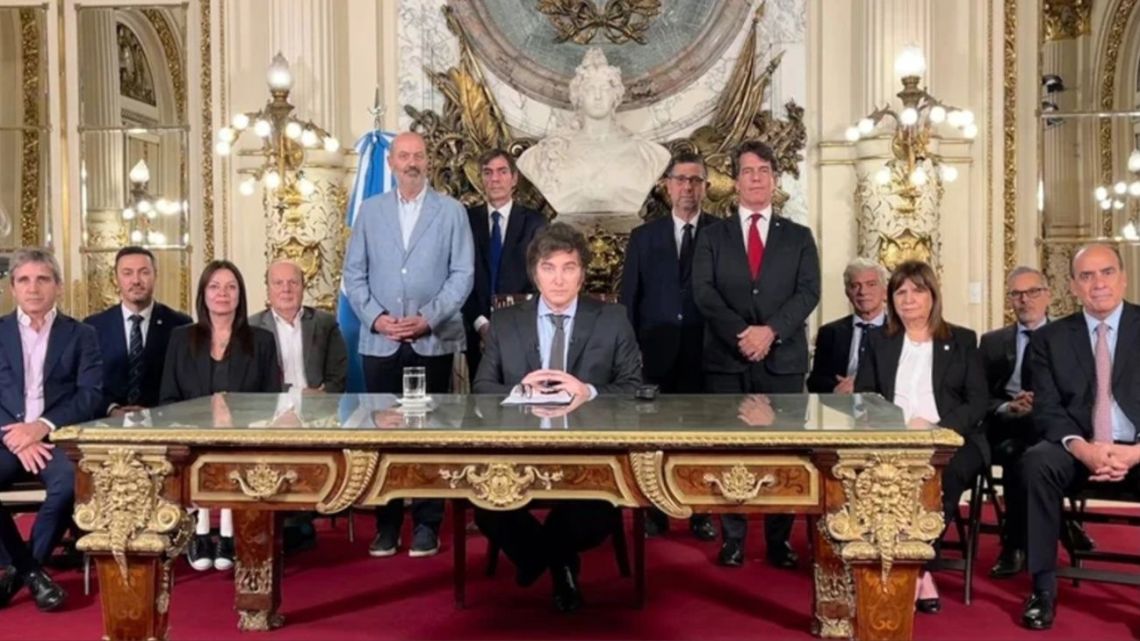Fiery political figures become so based on the legislation they propose, not the rhetoric they use, and the Omnibus law of 350 pages presented to the Argentine lower house by the new Libertarian President is fiery indeed.
Elected after a runoff with a popular mandate to end Argentina’s chronic economic disasters and inflation at 160%, Javier Milei has laid down the gauntlet, not shying away from including many proposals he campaigned on. Containing 664 changes or proposals to economic, tax, electoral, and executive laws, his administration has urged expediency within the legislature to review it and come to a vote or negotiations as soon as possible.
In response to the bill, the country’s General Confederation of Labour (CGT), a conglomerate of labor unions, declared a national strike—the earliest ever seen in an Argentine presidency.
Milei’s call for quick action is not without basis, and though the CGT may not like what the President is doing, the nation suffers chronic migraines of economic woes, including high inflation, 40% of the population living in poverty because of that inflation, unsustainable debts to foreign importers bringing materials and goods into the country, and a fiscal deficit that stretches back as far as the nation’s democracy.
But what’s inside the bill that has political opponents up in arms? Buenos Aires Times provided a brief summary, and without a doubt the most significant of the 664 articles is the declaration of a national emergency in “economic, financial, fiscal, social security, security, defense, tariff, energy, health, administrative and social matters until December 31, 2025”.
This can be unilaterally extended for another 2 years with a decision from the executive branch. It calls for the allocation of power to the executive branch to sell state-owned enterprises into private hands, and Milei has 41 such companies in mind, from the postal service to the national airline.
These are just two of the key points of a carefully constructed bill put together with the aid of a variety of legal experts overseen by Argentina’s most-cited economist, Federico Sturzenegger, who believes lawmakers will pass the bill “in some form” before March.
“The problem is not the chef but the recipe”
Milei talked a lot on the campaign trail about the need for “shock therapy” in the country’s political and economic worlds, and while he certainly delivered it, in a televised speech the week before New Year’s Eve, he chose the metaphor that the problem with Argentina is “the recipe” not “the chef”.
Sturzenegger also believes that so many of the market and regulatory reforms were in place because it took no effort to support them, but enormous effort to oppose them. Now, with his pen on the paper, deregulating sectors—he used satellite internet in an example with Buenos Aires Times—is very simple, because opposing it would require a specific bill outlining the regulation of one specific part of the economy out of the dozens Sturzenegger and Milei want to liberalize.
In fact, the bill itself is just a more official follow-up to what’s being called a “mega decree” issued by Milei that came into effect on the Friday before New Year’s Eve that declared the unilateral removal of 350 regulations in the economy, and had to be vetoed by both the Argentine Senate and Congress if they wanted to stop it; which they didn’t end up doing.
Sturzenegger had been working on the Omnibus deregulation for 18 months as part of another candidate’s election platform. Losing to Milei, both the candidate, Patricia Bullrich, and Struzenegger, joined up with Milei. He found a willing ally for his deregulatory mission in Milei’s Energy Secretary Eduardo Chirillo.
The struggle is well and truly on, and it’s not all going the President’s way. With the CGT Union representing over 7 million Argentine workers vowing to take the fight against the mega decree to the courts, the first in a series of three bond auctions to try and pay off $30 billion in outstanding debt to importers bringing goods into Argentina fell far short of expectations, with just $68 million worth of bonds sold out of $750 million on offer.
The bonds offer a flat 5% yield, and are called “bonds for the reconstruction of a free Argentina,” or “Bopreal,” and are denominated in dollars, not pesos.
“A chronic dollar shortage and strict capital controls during the previous government of President Alberto Fernández backlogged billions in payments, indebting importers and putting a bottleneck on trade,” wrote BA Times on Tuesday. “Before the Central Bank lifts all of Fernández’s financial controls, importers need to settle their debts abroad to improve the monetary authority’s balance sheet”.
The debt would be bought in local currency, which would hopefully clear out excess liquidity that might see inflation continue above 160%.
Returning to politics, Milei’s Libertarian Party controls just 15% of the seats in the lower house, and 10% in the senate, meaning that his Omnibus bill stands a high chance of being clipped apart by unwilling opposition parties of the status quo. However, the fact that they did not oppose the mega decree may say something about the traditional big government parties’ willingness to implement Milei’s ideas. WaL
PICTURED ABOVE: President Javier Milei, flanked by members of his cabinet (Federico Sturzenegger to his right) delivers a national address. PC: TÉLAM.



